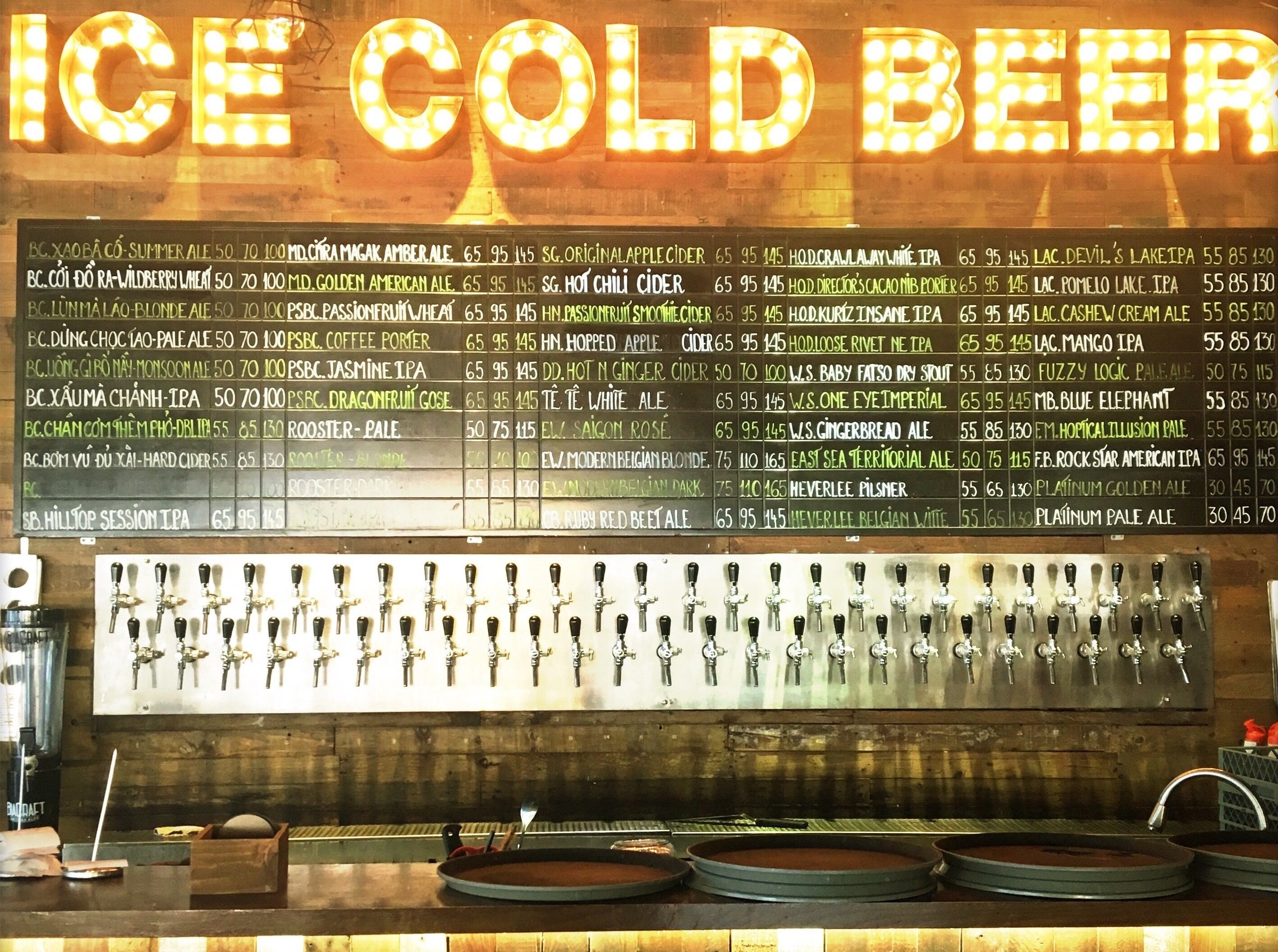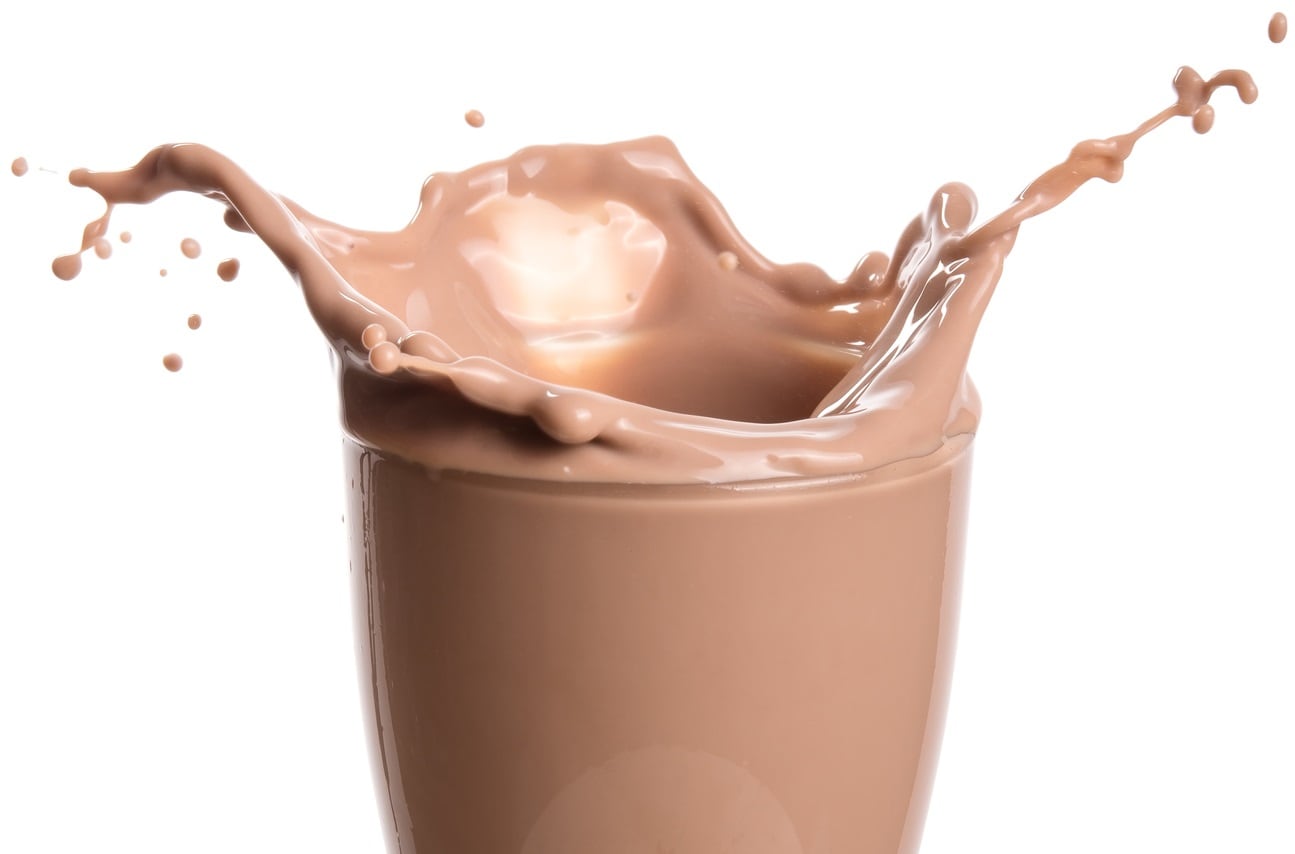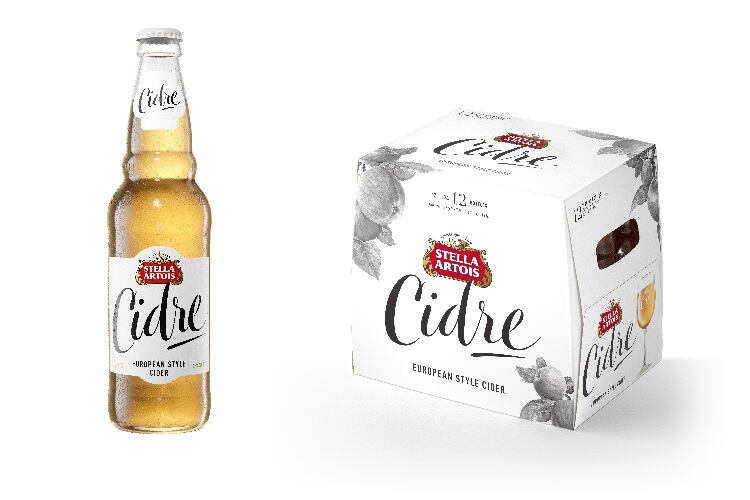“There was a rumour that Pasteur Street was about to open up a tap room,” Rubén Martínez, one of the co-founders of Tê Tê Craft Beer, recalled of the early days of the Saigon craft beer boom. “Rooster Beers had been starting to brew at home, the same as us. Fuzzy Logic was brewing. Platinum had already been brewing for a year.”
“There are now about 20-something breweries in Vietnam, and I’d say 10 of those were competing in Saigon. It’s getting very interesting and there are a lot of good beer bars here these days.”
Just three short years ago the city - also known as Ho Chi Minh City - began to embark on a brewing renaissance.
Before that, local brands like Sabeco-owned Saigon Beer and 333, and imported brews such as Heineken and Tiger, were the standards in this beer-swilling city.
Around 2015, however, home brewers and entrepreneurs started becoming attracted to its huge market of increasingly middle-class consumers and low barriers to business.
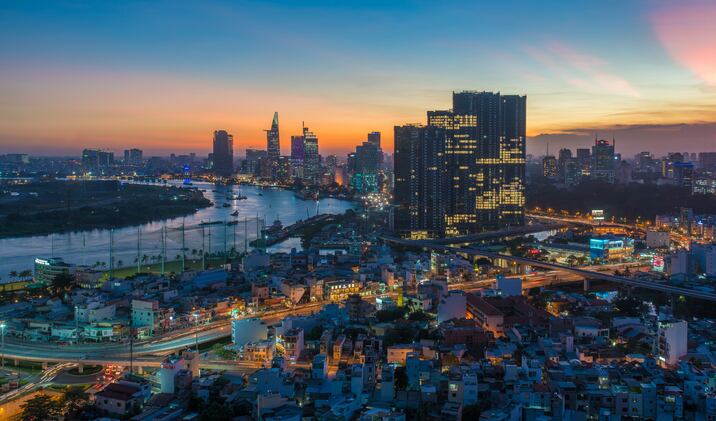
Home-brewing roots
“Compared to other countries in Asia, brewing in Vietnam is very easy,” said Agastya Jankipersadsing, director of Mad Genius Brewing, which recently acquired Fuzzy Logic.
“In Vietnam you can basically buy your ingredients and make your home-brew. Or you can walk into an established brewery and ask them, ‘Hey can I brew 2,000 litres?’.”
Those with available space found they could easily brew and distribute their own beer to local outlets. Most of the founders of the city’s craft scene had started out in home-brewing, he added.
Martínez and the four Tê Tê co-founders are typical. He and two others had been running a small marketing agency in the city, while his brother, Luís, was a biochemist back in Spain, who had studied brewing.
“Saigon has a good, affordable, friendly environment—everything a place needs,” he said. “The biggest drawback was the beer at the time was terrible, and so was the music. We’ve all come in to fix the beer, but someone needs to come in and fix the music.
“Our office work became a bit boring and we wanted to make our own product that we could do marketing and branding for, and see what happened. My brother was a brewer, so it was clear what we had to make.”
Tê Tê has only produced a single craft beer due to a lack of time and resources, but has been happy to adopt a long approach to growth.
“We had a strategy to make one thing well and develop a lifestyle around it—not just sell a yellow liquid with bubbles, but sell a whole attitude. We decided we didn’t need a lot of beers to do that; we just needed one good beer, a good name and some capital.”
Pasteur Street Brewing Company, which now has two tap rooms in Saigon and one in Hanoi where it sells several standards and a multitude of rarities, one-offs and seasonables, has focused on expansion and growth, however.
“Nobody could have predicted what was going to happen here locally. It’s blown up,” said Mischa Smith, the account manager at PSBC. “We were among the first wave, but after a year or so, you began to see companies—East West, Winking Seal, Heart of Darkness—coming in with a bigger investment at about the same time.
“We don’t try to be competitive about it, and overall we all like to work together. I like it when there’s more good local beer available, so I like seeing other companies coming in with very talented brewers and really good ideas about new styles and new combinations.”
A local twist
In a city full of expat professionals, many from countries like Britain, Australia and America, where craft beer is widespread, one might expect these to be the target of the breweries’ attention.
But a visit to venues like BiaCraft in District 2 and District 1’s Heart of Darkness, will see them packed out with local Saigoners. As well as being breweries in their own right, these locations and a growing number of others also provide outlets for the city’s craft beer brands.
To capitalise on this market, any craft brewer you speak to will explain how they set out to produce genuine local beers, rather than transplanting international styles to Southeast Asia—even those breweries that largely target expat business, like PSBC.
“The idea for us was always to do classic craft beer styles but give them a local twist—give them a Vietnamese ingredient that would distinguish it from a beer that was made in another country,” explained Smith.
Instead of a traditional IPA, for example, PSBC would produce a jasmine IPA; a passionfruit wheat beer would come instead of a classic wheat beer. The cacao nibs used to make its Cyclo chocolate stout, which won a gold medal at the World Beer Cup, is taken from farms nearby.
“We work with local farmers and get fresh local ingredients to make Vietnamese craft beer. It would be different if these were from anywhere else,” Smith added.
Affordability
Fuzzy Logic, which was perhaps the first to enter the Saigon craft beer movement—nobody seems to know for sure—believes in keeping prices affordable for local drinkers. Its cheapest beer retails for VND40,000 (US$1.72) per serving, which is very low for the city according to Dutch-born Jankipersadsing. Now his company is planning to expand its offerings and markets.
“When we took over, we said we are going to focus on our flagship, which is a pale ale,” he said. “It’s very easy to drink, not too hoppy, and we could hit a bit of volume with that. We also decided to start canning our beer—the first time Fuzzy Logic has done this.
“At the moment we have five styles. Hopefully, within the next six months we have another six more, so we have a very nice variety of beers. Our next step is to take our beers and casks to export to Thailand and Cambodia.”
The sizeable Thai craft scene is much more expensive, with bottles retailing for US$8-10 each because of the high cost of excise and import duties—all craft beer comes to Thailand from overseas because the domestic tax rates are too high to allow brewers to be profitable, Jankipersadsing says.
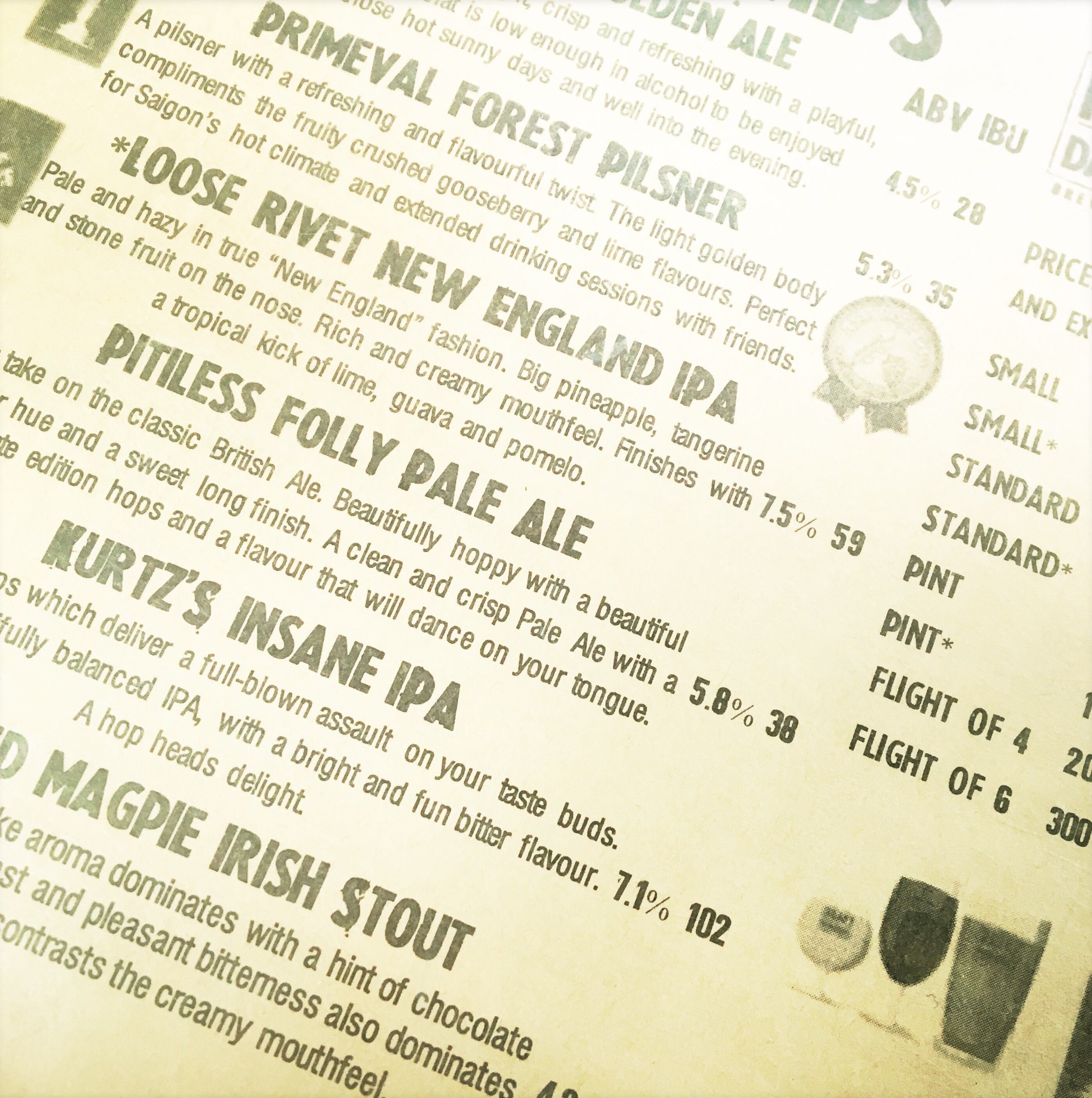
“A big surprise for me has been Cambodia. We started distributing there a little over a month ago, and our beers have been very well received. We’ve been doing very good sales there—we’ve just sent over another 100 cases to Siem Reap. Our next step will be to enter Hong Kong and Singapore and see how it works. I’m very positive about it.”
Likewise, Tê Tê is hoping to export its white ale to other parts of Southeast Asia. “Most other countries at the moment are more in need of beer than Vietnam,” said Martínez.
PSBC, however, has been focusing on its tap rooms, said Smith.
“We want to keep expanding—we think we’ve found the right model, the perfect size for us—and being very particular about locations. Export is great for branding, for visibility and marketing terms, but to be a profitable business, the fewer buffers between you as a company and your customers the better. Getting more tap rooms open, that’s been our major focus recently,” Smith said.
Consistency is key
But as only a roughly three-year-old industry, craft brewing is still a long way from maturity in Saigon. As is the case in most other places, quality and consistency tend to be an issue, especially as the scene was born largely from hobbyists. There is also the cost of expansion to consider, said Jankipersadsing.
“At one point, the bigger players are bound to decide the market, but it’s all about distribution now—how fast and how efficiently you can get your beers out,” he explained.
“For craft brewers here to survive, we really need to make our beers from a consistent recipe so there won’t be complaints that one batch is good, and another is bad. That’s something we’ve seen a lot of times, even with our beers. After a while we need to find a consistency in brewing and quality. If you have a good brand, you shouldn’t wait to invest in this.”
Likewise, Smith stresses that brewing beer to an adoring Saigon market is not all plain sailing, even for heavyweights like PSBC—especially with the extent of growth in competition, which doesn’t appear to be slowing.
“Those of us with our boots on the ground know how hard it is here,” he said. “It’s not like we are getting fat off the land and ready to move to the beach; we’re still working hard every day and carving out our piece of the market.
“But it’s tough, and the mainstream brewers have deep pockets. They don’t mind spending money to run the game. Craft is still expanding and it’s a good time to be part of the business, but it’s still a lot of hard work,” he added.

